Writing clear, consistent, and compliant progress notes is a critical, yet time-consuming, task for healthcare professionals. Finding the right format can feel overwhelming, with countless options scattered across different platforms. This guide simplifies that search by bringing together the best progress notes templates in one place. We've compiled a comprehensive list of resources, from dedicated practice management software to versatile template marketplaces.
Our goal is to help you quickly identify the ideal solution for your specific needs, whether you're in private practice, a large clinic, or a specialized field like mental health. We move beyond simple descriptions to provide practical insights into how each template functions in a real-world setting.
Inside this resource, you will find:
- Direct links to download or access each template.
- Screenshots to give you a clear visual of the layout and features.
- A breakdown of key functionalities and potential limitations.
- Guidance on customization and integration with your existing workflow.
This curated list is designed to save you hours of research. Instead of sifting through endless search results, you can efficiently compare top-tier options and select the progress notes templates that will streamline your documentation, improve your efficiency, and ensure you maintain high standards of care. Let's explore the best tools available.
1. Your Essential Progress Note Template Guide
Simbie AI’s "Your Essential Progress Note Template Guide" is a standout resource for healthcare providers seeking to refine their clinical documentation. Rather than just offering a downloadable file, this guide provides a comprehensive framework for creating and implementing a standardized template tailored to your practice's specific needs. It's an exceptional choice for organizations aiming to reduce administrative burdens and combat clinician burnout through smarter, more efficient workflows.
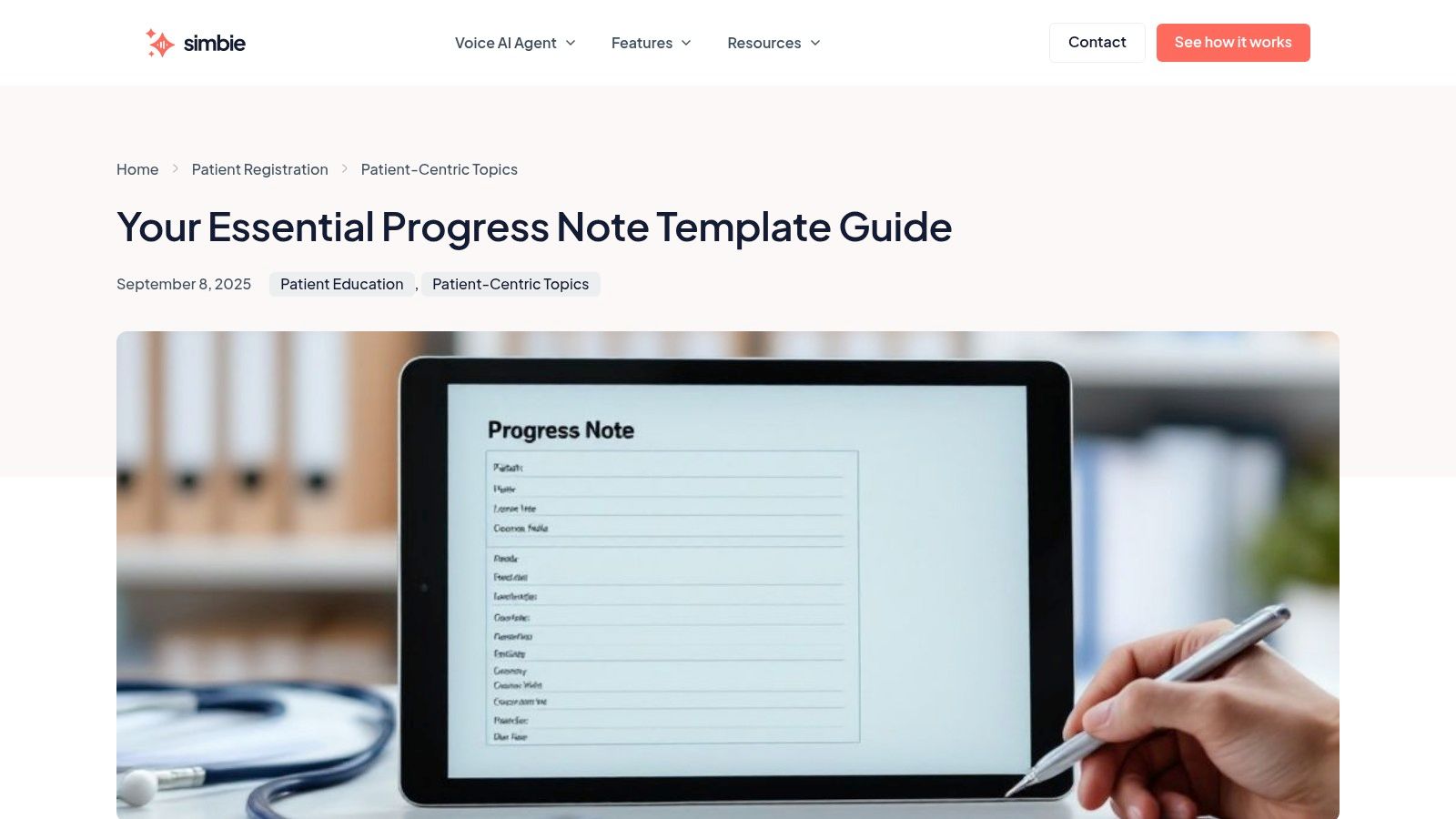
The guide excels by focusing on the why behind the template, not just the what. It demonstrates how a well-structured progress note can serve as a roadmap for each patient encounter, ensuring consistency and completeness. This approach transforms documentation from a chore into a tool that enhances team communication and supports regulatory compliance. Beyond simply using templates, grasping the principles of intelligent document organization can further optimize how your practice manages clinical data.
Key Strengths and Use Cases
This resource is particularly valuable for practices transitioning to a more structured documentation model or those looking to improve their existing system.
- Standardization: Creates a uniform note-taking process, which is crucial for multi-provider clinics to ensure consistent quality of care. This uniformity also simplifies staff training and onboarding, ensuring new team members can quickly adapt to the practice's standards.
- Efficiency: By streamlining documentation, clinicians can dedicate more time to patient interaction, a key factor in improving care outcomes. For more insights on this, you can explore Simbie AI's resources on clinical documentation improvement.
- Integration Potential: While the guide itself is a strategic resource, it is designed with Simbie AI’s automation platform in mind, offering a clear pathway to future EMR integration. This forward-thinking approach means the principles learned can scale with your practice's growth.
The primary limitation is its focus on template design principles; practices needing immediate, full automation will need to pair this guide with a broader AI solution. However, as a foundational tool for building better documentation habits, it is unparalleled.
Access: The guide is available for free on the Simbie AI website.
Best For: Healthcare administrators, practice managers, and clinical teams dedicated to system-wide documentation improvement.
2. TherapyNotes
TherapyNotes is a comprehensive Electronic Health Record (EHR) system designed specifically for behavioral health professionals. It’s an ideal solution for solo practitioners and group practices in the US seeking an all-in-one platform that integrates documentation with billing, scheduling, and client management. Its standout feature is the streamlined workflow for creating progress notes templates.
The platform’s SOAP note templates are built directly into the system and automatically pull in relevant data, such as client information, diagnosis codes, and appointment details. This pre-population feature significantly reduces manual entry and minimizes errors, allowing clinicians to focus more on the session content. The user interface is clean and intuitive, making navigation and note-taking straightforward even for less tech-savvy users. TherapyNotes also offers a secure client portal, which streamlines communication and form completion, further reducing administrative tasks for the clinical team.
Pricing and Access
TherapyNotes offers a transparent, subscription-based pricing model with a 30-day free trial.
- Solo Plan: Starts at $49 per month for a single user.
- Group Plan: Starts at $59 per month for the first clinician, with additional clinicians costing $30 per month each. This plan includes unlimited non-clinical staff accounts.
- Add-ons: Telehealth and e-prescribing services are available for an additional monthly fee.
Key Takeaway: TherapyNotes excels at creating efficient, integrated SOAP notes. Its purpose-built design for mental health professionals makes it a top choice for practices prioritizing documentation speed and accuracy within a complete practice management system.
Website: https://www.therapynotes.com
3. SimplePractice
SimplePractice is a widely recognized Electronic Health Record (EHR) and practice management software tailored for health and wellness professionals. It offers a powerful, all-in-one solution that combines scheduling, billing, telehealth, and comprehensive documentation tools. Its main strength lies in its highly flexible and customizable progress notes templates, making it a favorite among clinicians who want to adapt their documentation to their specific workflow.
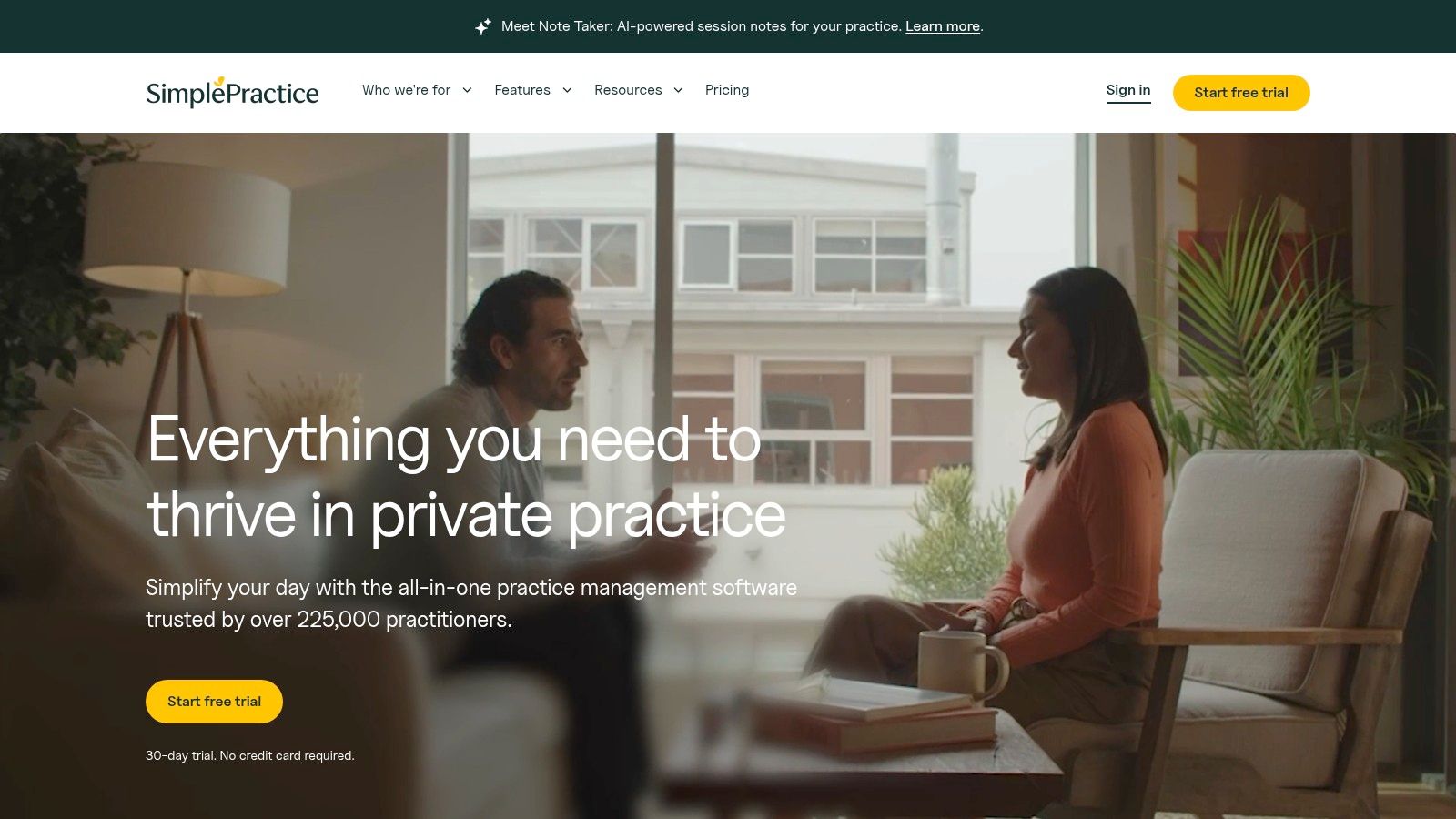
The platform provides a library of pre-built templates, including SOAP and DAP formats, which users can modify or build from scratch. A key feature is the optional integration with Wiley Treatment Planners, which allows clinicians to pull in evidence-based treatment objectives and interventions directly into their notes. This integration streamlines the creation of detailed, high-quality documentation while ensuring adherence to professional standards. The user interface is modern and user-friendly, supporting a seamless experience across the entire client journey. Furthermore, its client portal is highly rated for its ease of use, allowing clients to manage appointments, payments, and secure messaging effortlessly.
Pricing and Access
SimplePractice uses a tiered subscription model, with features varying by plan. A 30-day free trial is available.
- Starter Plan: Starts at $29 per month for solo practitioners, offering basic note templates and core features.
- Essential Plan: Starts at $69 per month, adding telehealth and enhanced documentation options.
- Plus Plan: Starts at $99 per month, designed for group practices with advanced features and customization. Wiley Treatment Planner integration is an available add-on.
Key Takeaway: SimplePractice is ideal for practitioners seeking a highly customizable documentation system within a comprehensive practice management ecosystem. Its flexibility and powerful Wiley integration make it a top choice for those wanting to tailor their progress notes templates precisely to their practice needs.
Website: https://www.simplepractice.com
4. TheraNest
TheraNest is a behavioral health EHR platform known for its robust and highly customizable documentation capabilities. It is an excellent choice for practices of all sizes that prioritize detailed, content-rich notes and require supervisory oversight. Its distinguishing feature is the optional integration with Wiley Practice Planners, offering a vast library of pre-written goals, objectives, and interventions that streamline the creation of progress notes templates and treatment plans.
The system allows clinicians to build custom note templates from scratch or modify existing ones to fit specific therapeutic modalities like CBT, DBT, or play therapy. For practices with interns or associate therapists, TheraNest’s supervisory workflow is a key advantage, enabling seamless review, feedback, and co-signing of notes directly within the platform. The interface is user-friendly, guiding clinicians through the documentation process efficiently. The platform also includes robust reporting features, helping practice managers track key metrics related to client progress, billing, and staff productivity.
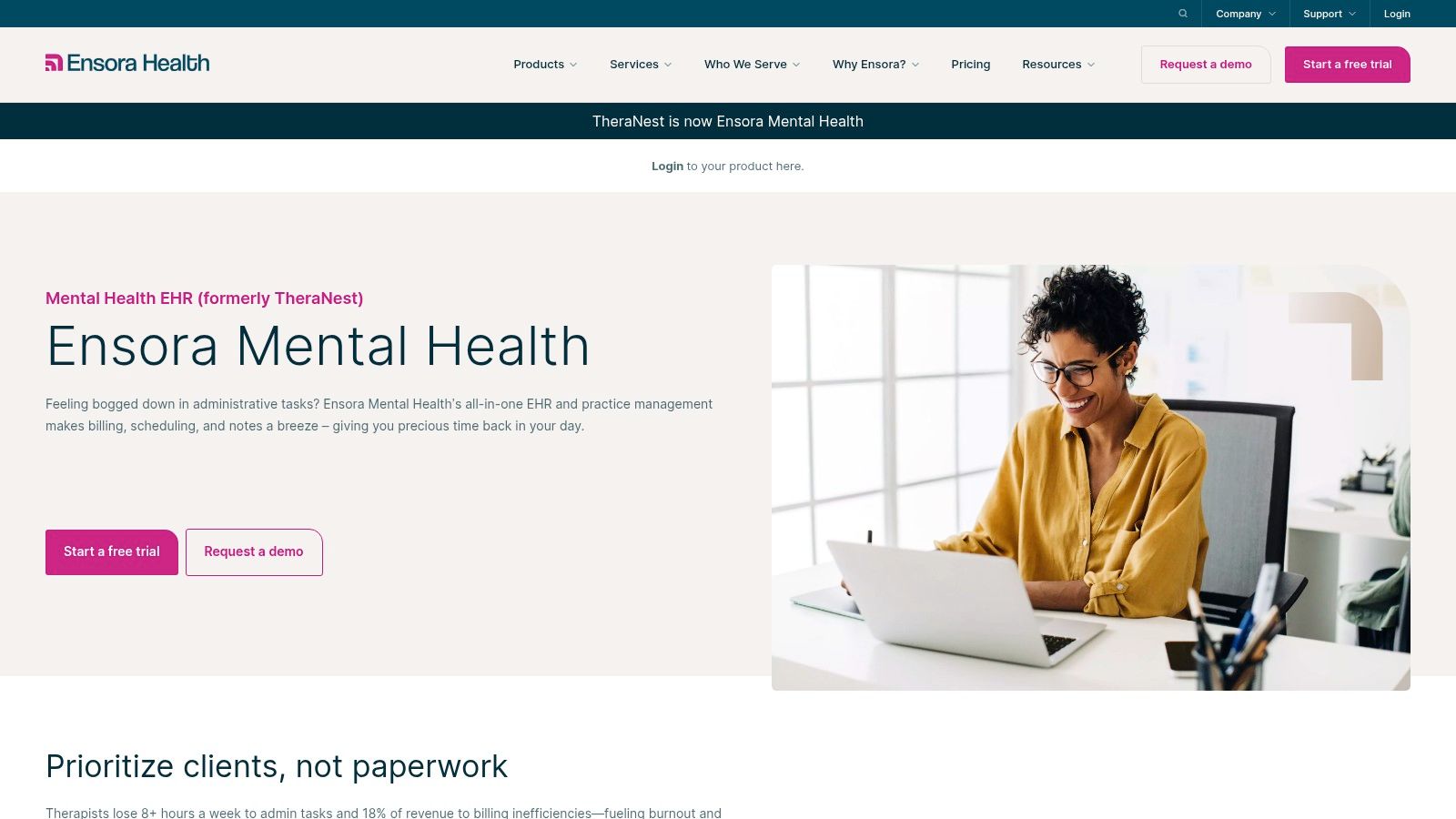
Pricing and Access
TheraNest uses a tiered pricing model based on the number of active clients, which can be cost-effective for practices with fluctuating caseloads. A 21-day free trial is available.
- Up to 30 clients: Starts at $39 per month for the first therapist.
- Up to 40 clients: Starts at $49 per month for the first therapist.
- Up to 50 clients: Starts at $59 per month for the first therapist.
- Add-ons: Wiley Practice Planners, telehealth, and other features are available for additional fees.
Key Takeaway: TheraNest stands out with its deep content integration via Wiley Practice Planners and strong supervisory features. It's ideal for training environments and practices that want to accelerate note-writing with evidence-based, pre-written content.
Website: https://theranest.com
5. TheraPlatform
TheraPlatform is an all-in-one EHR and practice management solution designed for therapists, excelling in its highly flexible and customizable documentation capabilities. Its main advantage is the robust template builder, which allows practitioners to create or modify progress notes templates to fit their exact workflow, supporting various formats like SOAP, DAP, and BIRP. The platform also features an extensive built-in library, saving clinicians significant setup time.
For practices looking to streamline documentation further, TheraPlatform offers AI-assisted note-taking as a paid add-on. This feature helps generate concise, compliant notes, reducing the administrative burden. The system integrates documentation seamlessly with other practice management functions, including scheduling, billing, and telehealth, making it a comprehensive tool for both solo and group practices. This focus on automation aligns with modern approaches to healthcare workflow automation, helping to boost efficiency. Its telehealth functionality is particularly strong, with interactive tools like whiteboards and screen sharing built directly into the video sessions.
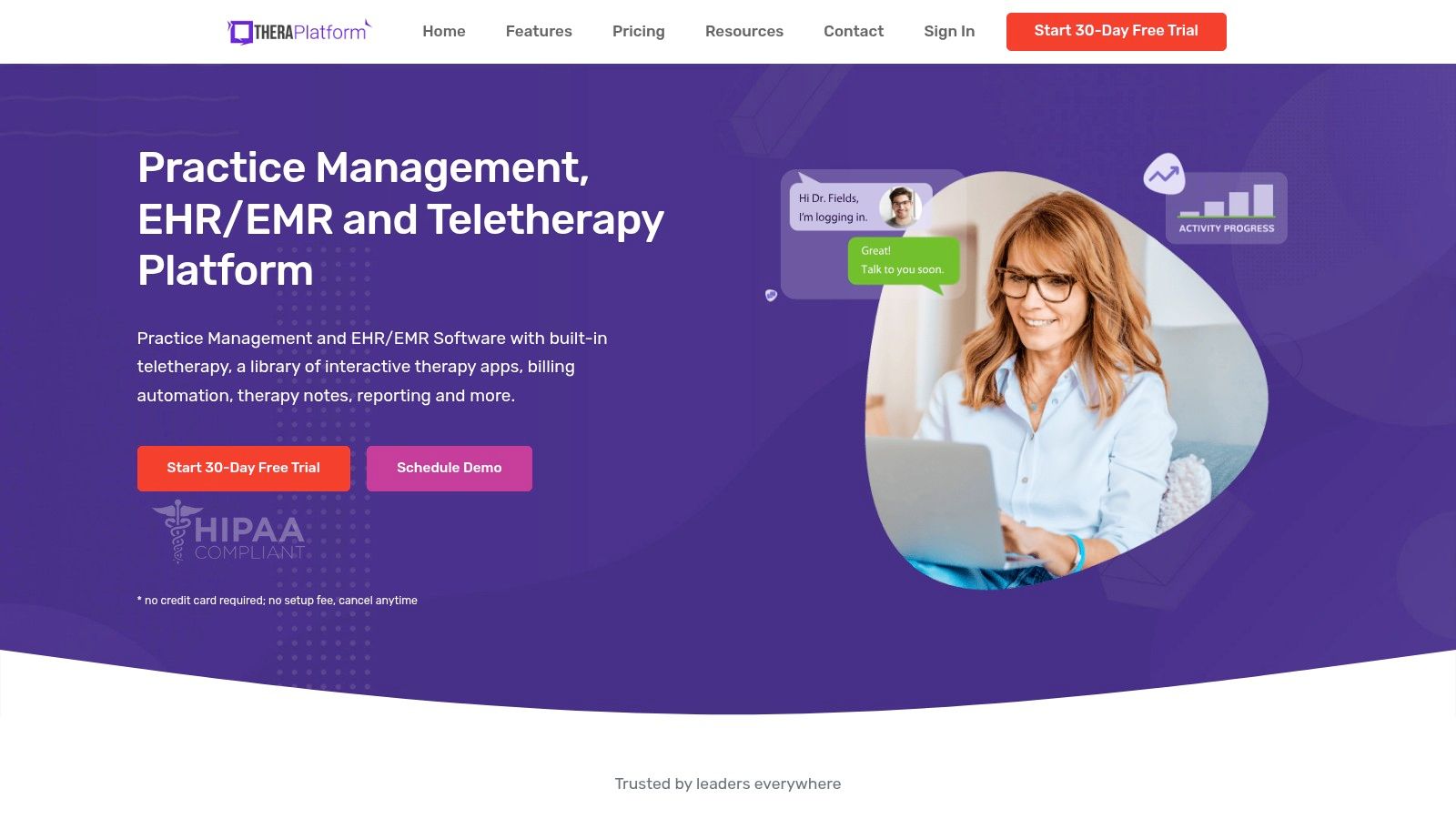
Pricing and Access
TheraPlatform offers several subscription tiers with a 30-day free trial.
- Basic Plan: Starts at $39 per month for a single user, focused on scheduling and billing.
- Pro Plan: Starts at $49 per month, adding documentation and telehealth features.
- Pro Plus Plan: Starts at $59 per month, including advanced features like Wiley Planners and client portals.
- Add-ons: AI note assistance is available as an additional license.
Key Takeaway: TheraPlatform is a top choice for practitioners who need maximum flexibility in their progress notes. Its powerful template builder and optional AI tools make it ideal for practices that want to customize their documentation process without being locked into a rigid system.
Website: https://www.theraplatform.com
6. Practice Better
Practice Better is a modern practice management platform favored by nutritionists, dietitians, and integrative health practitioners, though it also serves behavioral health providers well. It offers a highly flexible system where users can build custom forms and progress notes templates from scratch or modify existing ones. Its strength lies in its all-in-one approach, combining documentation with telehealth, billing, client messaging, and even online course delivery.
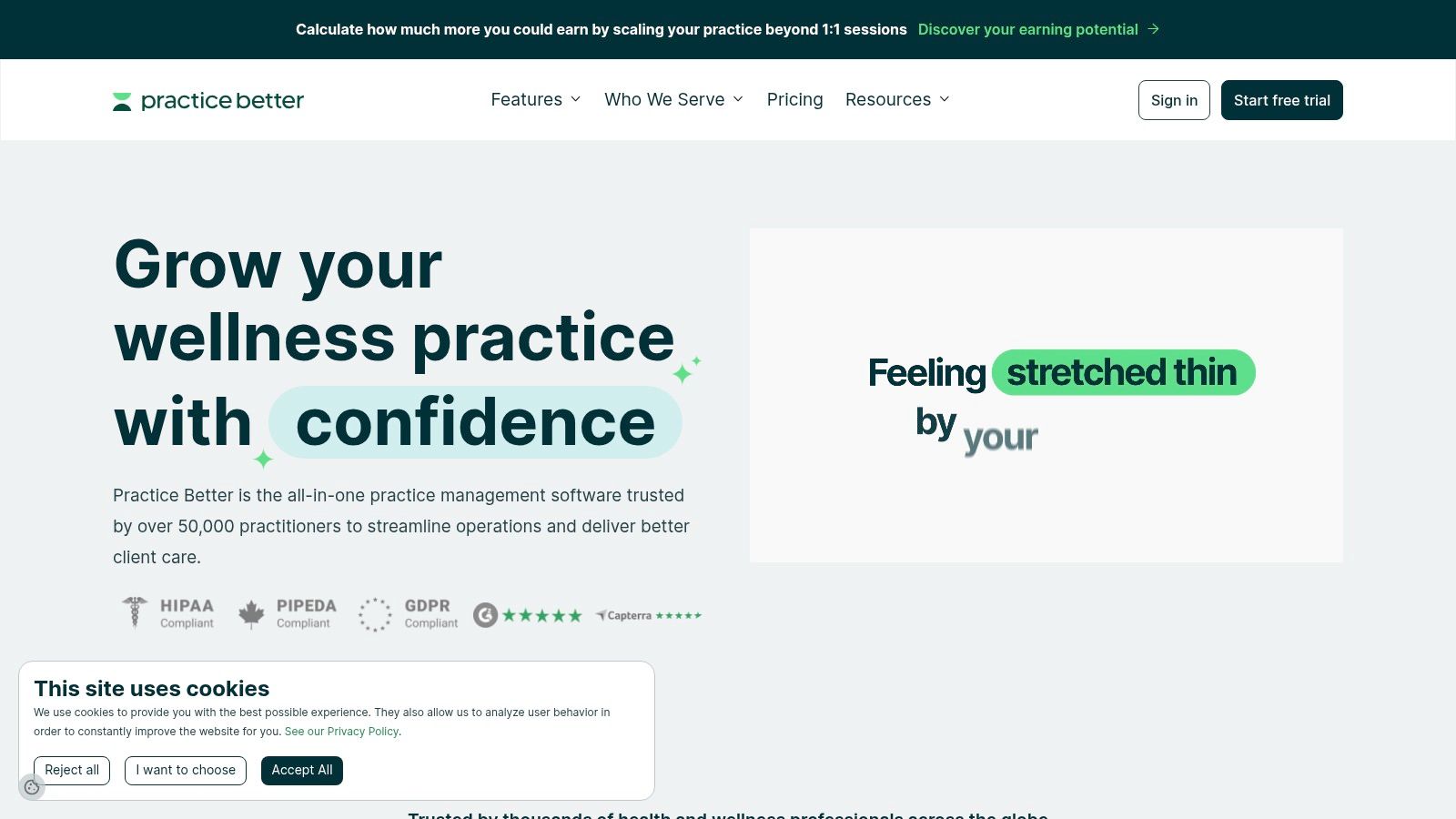
The platform's template builder is intuitive, allowing for a variety of field types, from simple text boxes to checkboxes and dropdowns. This makes it easy to create notes that perfectly match a practitioner’s unique workflow. Its automation features are also a major plus, enabling automated appointment reminders and follow-up messages that can be linked to specific services, saving significant administrative time. The user interface is clean, modern, and easy to navigate. This platform is particularly well-suited for practices that sell packages or programs, as it seamlessly integrates these offerings with client management and documentation.
Pricing and Access
Practice Better provides a scalable, feature-tiered subscription model, including a free starter plan.
- Sprout Plan: Free for up to 3 clients, offering basic features.
- Starter Plan: Starts at $25 per month for up to 10 clients.
- Professional Plan: Starts at $59 per month for up to 200 clients and adds advanced features like telehealth and custom branding.
- Team Plan: Starts at $135 per month for multiple practitioners and includes unlimited clients and storage.
Key Takeaway: Practice Better is an excellent choice for wellness and integrative health professionals who need highly customizable progress notes templates within a comprehensive, modern, and scalable practice management platform.
Website: https://practicebetter.io
7. ICANotes
ICANotes is a specialized Behavioral Health EHR designed for both outpatient and inpatient settings, particularly excelling in psychiatry. Its unique approach to documentation sets it apart from competitors. Instead of free-text typing, it uses a menu-driven, button-based system to construct comprehensive progress notes templates and clinical narratives. This structured input method is engineered to generate highly detailed, compliant notes with remarkable speed.
The platform's strength lies in its ability to quickly create syntactically correct and clinically robust documentation that meets rigorous billing and auditing standards. Clinicians navigate through a series of menus to select relevant phrases and observations, which ICANotes then assembles into a complete narrative. While this requires an initial learning curve, it dramatically reduces note-taking time once mastered and minimizes the risk of leaving out critical information. The system is pre-configured with content for a wide range of mental health disciplines, ensuring that notes are not only fast but also clinically relevant and thorough.
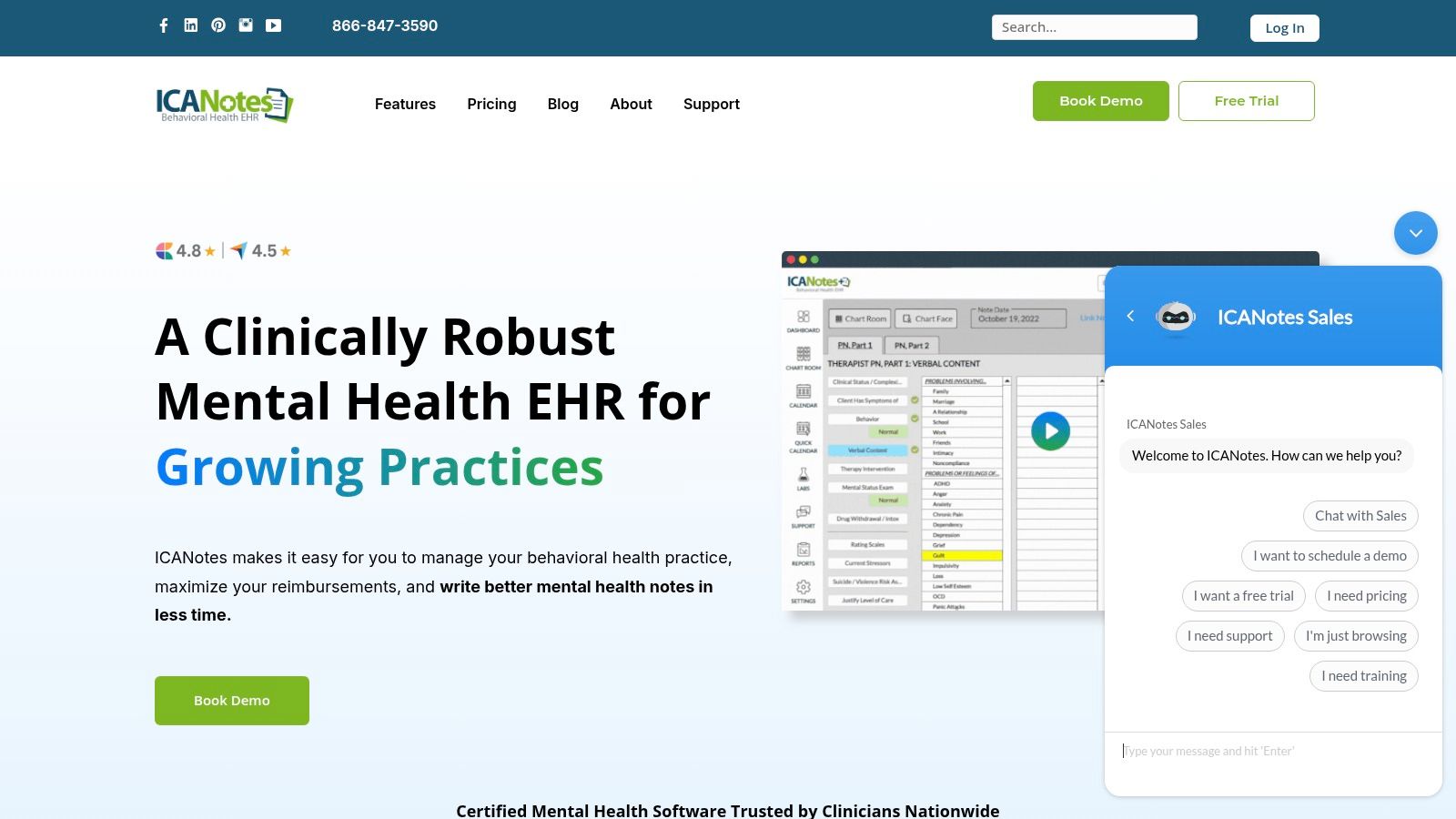
Pricing and Access
ICANotes offers tiered pricing based on user roles and requires a one-time activation fee. They provide personalized quotes upon request.
- Prescribing Provider Plan: A comprehensive plan designed for clinicians who require e-prescribing and lab integration features.
- Therapy Provider Plan: A tailored plan for therapists and counselors focused on documentation, treatment planning, and billing.
- Group and Enterprise Plans: Custom pricing is available for larger practices and organizations requiring multiple user types and advanced features.
Key Takeaway: ICANotes is the go-to solution for behavioral health providers who prioritize speed and compliance in their documentation. Its unique button-driven system is ideal for creating thorough progress notes that stand up to scrutiny, making it a powerful tool for busy psychiatric and therapy practices.
Website: https://www.icanotes.com
8. Jotform
Jotform is a versatile online form builder that offers a vast library of progress notes templates for healthcare professionals. It’s an excellent choice for practices that need a simple, web-based solution for documentation without committing to a full-scale EHR system. Its key strength lies in its high degree of customizability and ease of use, allowing users to create and deploy secure digital forms quickly.
The platform provides dozens of pre-made templates, including SOAP, DAP, and BIRP formats, which can be cloned and modified with a drag-and-drop interface. This flexibility allows clinicians to tailor forms to their specific needs, adding or removing fields as required. Jotform forms can be embedded directly onto a practice website or shared via a secure link, making them highly accessible for telehealth and mobile documentation. Integrations with over 100 other applications streamline data management. For example, a completed form can automatically create a PDF, send a notification, and add data to a Google Sheet, creating a lightweight automated workflow.
Pricing and Access
Jotform offers a tiered pricing model, including a robust free plan. HIPAA compliance, however, is only available on paid plans.
- Starter Plan: Free, with limits on forms, submissions, and storage.
- Bronze Plan: Starts at $34 per month (billed annually) and includes HIPAA compliance.
- Silver & Gold Plans: Offer higher limits and more features for growing practices.
- Enterprise Plan: Custom pricing for large organizations requiring advanced security and support.
Key Takeaway: Jotform is the ideal solution for creating highly customized, standalone progress notes templates with minimal technical effort. It’s perfect for solo practitioners or small clinics needing a flexible, HIPAA-compliant form builder that integrates well with other tools.
Website: https://www.jotform.com
9. Carepatron
Carepatron is a modern practice management platform that stands out with its community-driven template library. It is an excellent choice for solo practitioners and small teams who need a simple, collaborative solution for their documentation. Its key feature is the ability for users to browse, copy, and customize a wide range of progress notes templates and other clinical forms shared by the community.
The platform integrates these templates directly into client records, streamlining the documentation process. Features like "data chips" automatically populate client information, and quick insert tools speed up note-taking. This makes it incredibly efficient for practitioners who want lightweight, yet effective, documentation workflows without the complexity of a full-scale EHR. The ability to share templates with teams or send forms securely through a client portal adds a layer of modern convenience. The user interface is notably clean and intuitive, making it one of the easiest platforms to adopt for clinicians who may be less comfortable with technology.
Pricing and Access
Carepatron offers a freemium model, making it accessible for practitioners just starting out.
- Free Plan: Includes basic features for one user, with access to the template library.
- Professional Plan: Starts at $12 per user, per month (billed annually), and unlocks unlimited storage, group features, and advanced integrations.
- Organization Plan: Starts at $19 per user, per month (billed annually), offering full HIPAA compliance, advanced security, and dedicated support.
Key Takeaway: Carepatron is ideal for small practices seeking a simple, community-powered approach to documentation. Its extensive, free template library and easy-to-use interface make it a top contender for those who prioritize flexibility and cost-effectiveness over a comprehensive EHR feature set.
Website: https://www.carepatron.com
10. Template.net
Template.net is a vast online library offering downloadable and editable documents for nearly every professional need, including a wide selection of progress notes templates. It serves as a go-to resource for healthcare practitioners across various fields-such as medicine, nursing, psychotherapy, and occupational therapy-who prefer file-based templates over integrated software systems. The platform's main advantage is its sheer volume and variety, providing instant access to documents for nearly any clinical scenario.
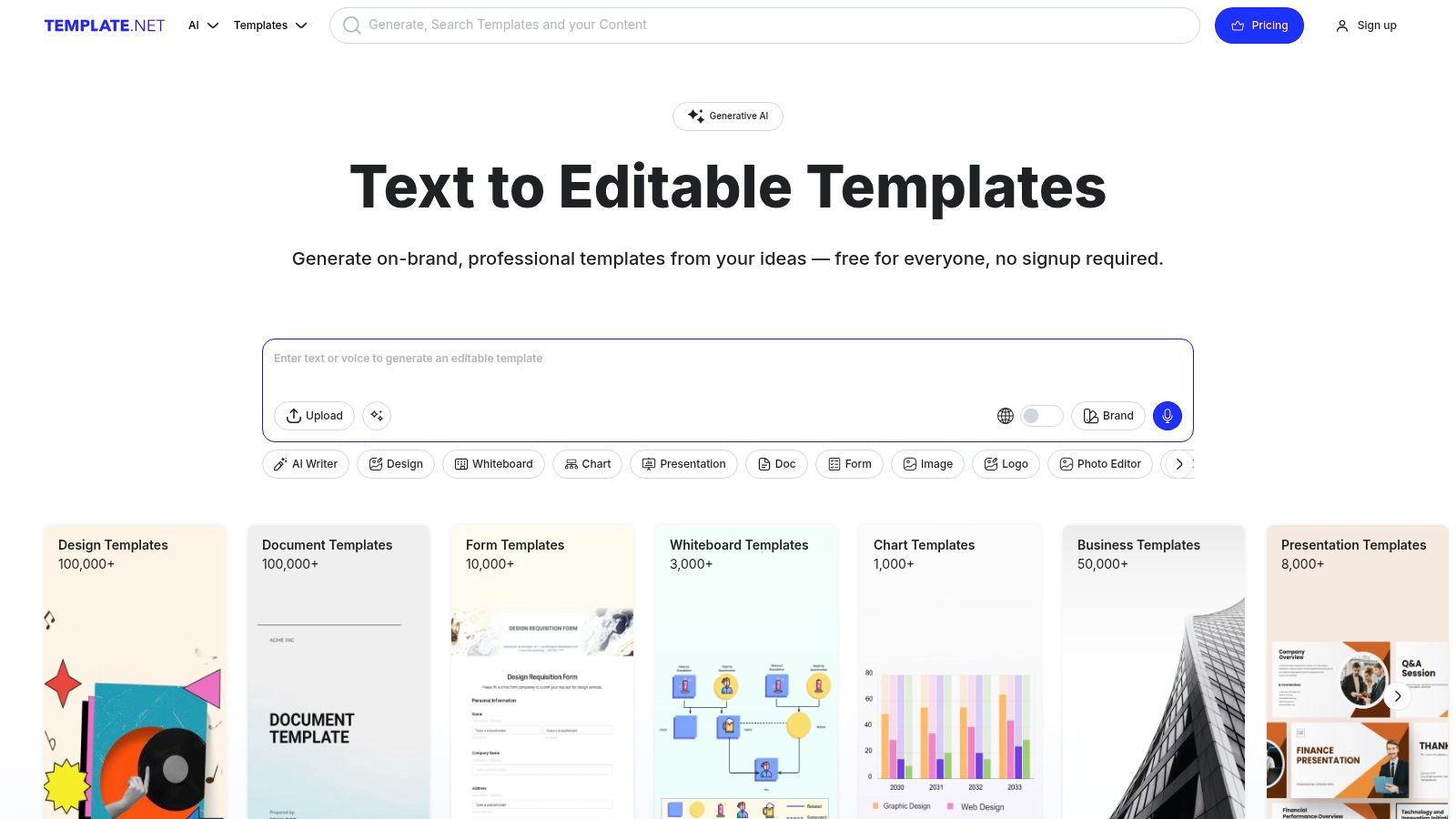
Users can easily search for a specific type of progress note, download it, and begin editing in familiar software like Microsoft Word, Google Docs, or Adobe PDF. This is ideal for practitioners who need a printable form for physical records or a simple digital file without committing to an EHR subscription. However, because these are standalone files, they do not integrate with any practice management software, requiring completely manual data entry for each use. The quality and comprehensiveness of the templates can also vary significantly, so users should carefully review documents to ensure they meet professional and regulatory standards.
Pricing and Access
Template.net operates on a freemium model, offering both free and premium templates.
- Free Templates: A large selection of basic templates is available for free download after creating an account.
- Pro Plan: Starts at $8.25 per month (billed annually) for unlimited access to their premium library of over 200,000 professional templates, with 24/7 customer support.
Key Takeaway: Template.net is an excellent source for practitioners who need quick, one-off access to a diverse range of editable and printable progress note templates. It’s best for those who prioritize flexibility and work with standard office software rather than a dedicated EHR system.
Website: https://www.template.net
11. Amazon
While most solutions for progress notes are digital, Amazon provides a vast marketplace for physical, pre-formatted notebooks and notepads. This option is surprisingly practical for clinicians, students, or healthcare professionals who prefer tangible documentation or work in settings where quick, on-the-go paper notes are essential, like during ward rounds or in fast-paced clinical environments. The platform’s standout feature is the sheer variety of available progress notes templates in physical form.
You can find everything from detailed SOAP note pads to simple progress note journals, each designed with specific layouts to guide documentation. The user-generated reviews are invaluable for assessing the quality of the paper, the clarity of the printed templates, and the overall usability of a notebook before purchasing. This old-school method provides a straightforward, no-frills approach to note-taking without the need for software or internet access. However, it's crucial to remember that physical notes must be stored securely to maintain patient privacy, and they lack the searchability and backup capabilities of digital records.
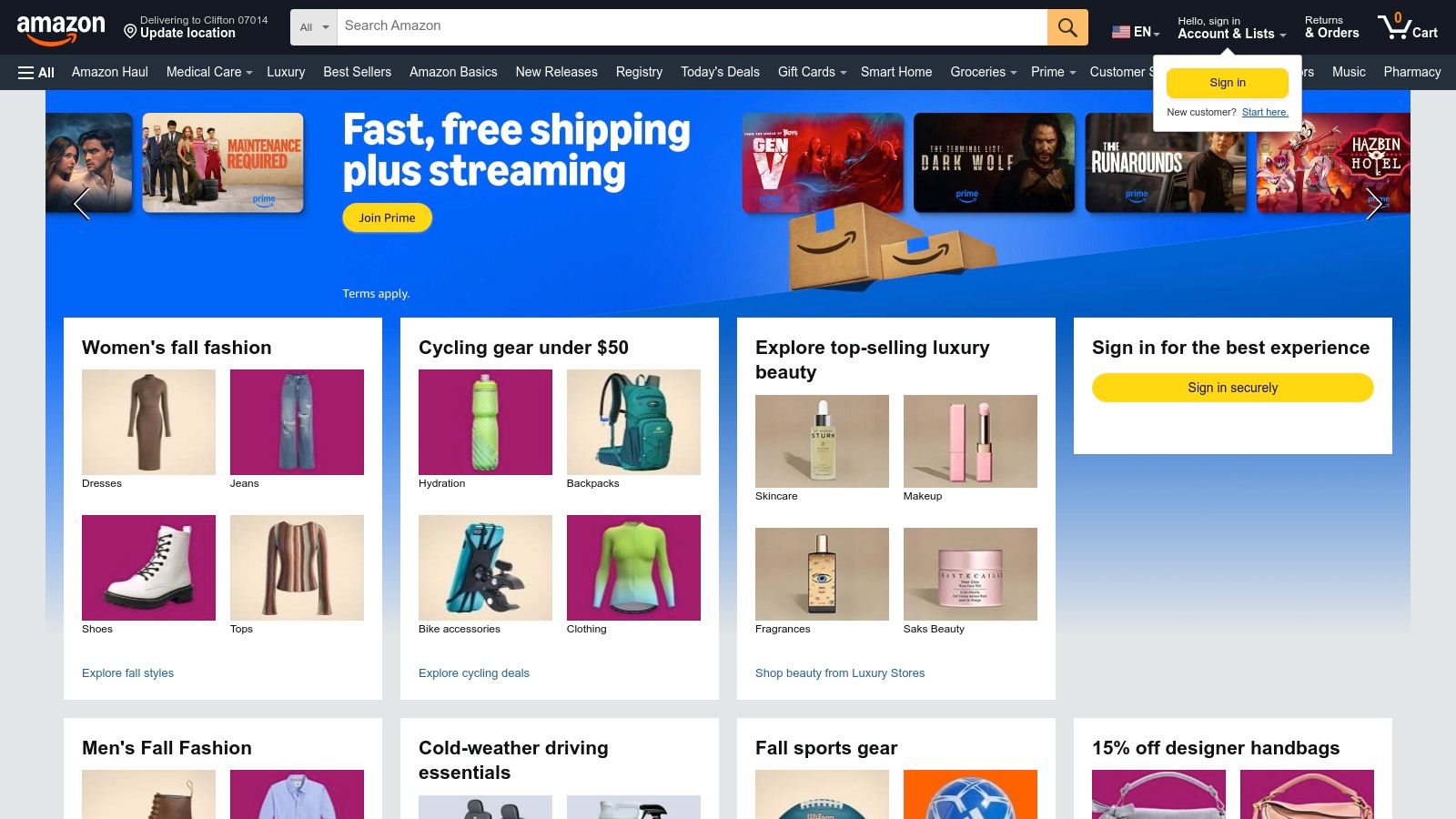
Pricing and Access
Pricing on Amazon is product-dependent, offering accessible options for nearly any budget.
- Notepads: Typically range from $8 to $15 for pads of 50-100 templated sheets.
- Notebooks: Bound journals with structured pages usually cost between $10 and $25.
- Shipping: Many items are eligible for free and fast shipping with an Amazon Prime membership.
Key Takeaway: Amazon is the go-to source for physical progress note templates. It’s ideal for practitioners who favor paper documentation or need a non-digital backup, though it is not HIPAA-compliant and requires manual scanning to digitize records.
Website: https://www.amazon.com
12. Etsy
Etsy is an unconventional yet powerful resource for clinicians seeking affordable and visually appealing progress notes templates. As a global marketplace for creative goods, it hosts hundreds of independent creators offering downloadable templates in various formats, including PDF, Google Sheets, and Canva. This platform is particularly well-suited for solo practitioners, students, or interns who need a low-cost, immediate solution without the commitment of an EHR system. Its standout feature is the sheer variety of designs, from minimalist to comprehensive, often including specialized sections like a Mental Status Exam (MSE).
The templates available range from classic SOAP and DAP notes to more niche formats tailored for specific therapeutic modalities. Because they are digital downloads, access is instant upon purchase. Many sellers provide templates that are easily editable, allowing for customization to fit a clinician’s specific workflow or branding. User reviews and ratings offer valuable insights into the quality and usability of a template before purchase, helping you find a reliable and well-designed option. This makes it a great way to experiment with different formats before committing to a specific style for your practice.
Pricing and Access
Etsy’s model is based on one-time purchases, not subscriptions, making it highly cost-effective.
- One-Time Purchase: Most templates cost between $2 and $15 for a digital file.
- Bundles: Many sellers offer bundles of multiple templates (e.g., intake forms, treatment plans, and progress notes) at a discounted price.
- Instant Access: Files are available for immediate download after the transaction is complete.
Key Takeaway: Etsy provides a vast, affordable, and instantly accessible marketplace for diverse progress notes templates. It’s an excellent choice for clinicians who value creative designs and customization, but users must independently verify that templates meet their specific clinical and compliance requirements.
Website: https://www.etsy.com
Top 12 Progress Notes Template Comparison
| Product | Core Features/Workflow | User Experience ★ | Value Proposition 💰 | Target Audience 👥 | Unique Selling Points ✨ |
|---|---|---|---|---|---|
| Your Essential Progress Note Template Guide | Standardized progress note templates; EMR integration | ★★★★☆ Streamlines documentation | 💰 Free resource; reduces burnout | Clinicians seeking documentation consistency | ✨ Clinically designed; supports compliance |
| TherapyNotes | SOAP auto-filled notes, billing, telehealth add-ons | ★★★★ Transparent plans, easy to use | 💰 Mid-tier, add-ons extra | Mental health solo & group practices | ✨ Integrated AI tools (TherapyFuel) |
| SimplePractice | Customizable notes, telehealth, billing, client portal | ★★★★ Broad usability, flexible templates | 💰 Pricing increases for groups | Behavioral health providers US-wide | ✨ Wiley Treatment Planner integration |
| TheraNest | Progress notes, treatment plans, supervisory workflows | ★★★★ Strong documentation tools | 💰 Tiered pricing by client count | Providers needing deep content integration | ✨ Wiley content; co-signing, addendums |
| TheraPlatform | Multiple note formats, AI-assisted notes, ICD-10 coding | ★★★★ Flexible, 30-day free trial | 💰 Competitive, AI tools extra cost | Practices needing robust editing tools | ✨ AI note assistance; template builder |
| Practice Better | Forms/templates, telehealth, messaging, billing | ★★★☆ Affordable, modern UI | 💰 Entry-level affordability | Dietitians, nutritionists, small teams | ✨ Team plans with scalable storage |
| ICANotes | Menu-driven customizable templates, eRx, lab integration | ★★★★ Fast entry; strong compliance | 💰 Activation fee + monthly pricing | Psychiatry & therapy (in/outpatient) | ✨ Rapid compliant note generation |
| Jotform | HIPAA-compliant form builder, templates, 100+ app integrations | ★★★☆ Quick setup, scalable | 💰 Free to paid plans | Clinics needing forms without full EHR | ✨ Large app integrations; web form embedding |
| Carepatron | Community template library, auto-fill tools, client portal | ★★★☆ Simple, lightweight | 💰 Low cost; some features paid | Small teams with lightweight documentation | ✨ Community-shared templates |
| Template.net | Downloadable/editable templates by specialty | ★★★ Quick offline use | 💰 Mostly free; no software needed | Providers wanting printable file-based forms | ✨ Wide specialty coverage; file format variety |
| Amazon | Physical notebook templates with progress note formats | ★★ Immediate low-cost paper | 💰 Low price, no digital integration | Clinicians/students preferring paper | ✨ Ready-to-use physical forms |
| Etsy | Downloadable digital templates (PDF, Google Sheets, Canva) | ★★★ Budget-friendly | 💰 Very affordable | Solo clinicians, interns | ✨ Variety of formats; creator marketplace |
Beyond the Template: Charting Your Path to Efficient Documentation
We've explored a wide spectrum of solutions, from comprehensive EHR platforms like TherapyNotes and SimplePractice to highly customizable form builders like Jotform and even tangible, pre-printed options from Etsy. The journey through these diverse progress notes templates has likely made one thing clear: there is no single "best" option. The right choice is deeply personal to your practice's unique workflow, specialty, and technological comfort level.
The key takeaway is that the template itself is just the starting point. The real value comes from how you integrate it into your daily operations to reclaim time, improve accuracy, and ultimately, enhance patient care. A sophisticated EHR might offer incredible automation but come with a steep learning curve and high cost. Conversely, a simple downloadable PDF from Template.net is accessible but lacks the dynamic features needed for a growing practice. Your choice should reflect a balance between current needs and future goals.
Making Your Final Selection
As you weigh your options, move beyond the feature lists and consider the practical realities of implementation. Your decision should be guided by a clear-eyed assessment of your specific needs.
- For the Solo Practitioner or Small Clinic: Prioritize ease of use and affordability. Tools like Carepatron or Practice Better offer a fantastic balance of features without overwhelming a small operation. A simple, well-designed digital template from Jotform might also be sufficient if you already have a patient management system you like. The key is to find a solution that reduces administrative time without adding unnecessary complexity to your daily tasks.
- For the Growing Practice or Large System: Scalability and integration are paramount. Look at robust systems like TheraNest or ICANotes that can handle complex billing, multi-provider scheduling, and extensive reporting. The investment in a comprehensive platform pays off through long-term efficiency and compliance. These systems are designed to grow with you, ensuring that your documentation process remains consistent and manageable as your client base expands.
- For the Tech-Savvy and Customization-Focused: If you need absolute control over your forms and workflows, a flexible tool like Jotform is your best bet. This allows you to build progress notes templates from the ground up, tailored precisely to your methodology, a feat not always possible with rigid EHR systems. This path is ideal for clinicians with a unique approach to care who find standard templates too restrictive.
A Final Thought on Implementation
Remember that adopting a new template or system is a process of change management. Involve your staff in the decision-making process, plan for a training period, and be prepared to iterate. The goal isn't just to find a new template; it's to build a more streamlined, less burdensome documentation system. By choosing thoughtfully and implementing strategically, you can transform progress notes from a daily chore into a powerful tool that supports both your practice's health and your patients' well-being.
Ready to take the next leap beyond templates? If you're looking to eliminate the manual work of writing progress notes altogether, explore how Simbie AI can automatically generate compliant, high-quality clinical documentation from your patient conversations. Spend less time typing and more time with your patients by visiting Simbie AI to see how it works.

